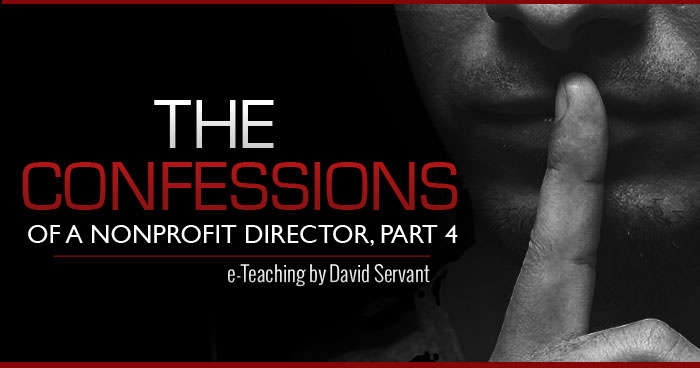In my previous e-teaching in this series, I promised that I’d share with you the story of the biggest spiritual event in my life, besides being born again. I’ve told this story hundreds of times around the world since it happened. It is my tenth confession.

I was in the midst of my third church-planting pastorate, which began in 1991. In just a few years, the congregation had grown from five people (my wife, myself, and our three children) to close to 300 people (if you counted pregnant women twice, which I did). We’d rented public school space for several years and then purchased acreage on which we erected a church building. The sanctuary could seat 400 people. We borrowed $800,000 from the bank, and that, along with our savings, got us Sunday School rooms, wall-to-wall carpeting, air conditioning, offices, and a paved parking lot.
Sunday attendance was growing and offerings were increasing. I was making more money than I ever had, thanks to a generous church board. My wife and I borrowed money and built a four bedroom, three-bathroom brick home on ten hilltop acres with a huge deck to enjoy the view. I also bought a shiny red lawn tractor. And when I drove around my yard on that tractor and looked at my house, I loved it.
But it wasn’t long after that I was reading Jesus’ words to the seven churches of Asia, found in the first chapters of the book of Revelation. I noticed that Jesus’ opinion of some of those churches was much different than their own opinion of themselves. For example, He said to the church in Laodicea, “You say, ‘I am rich, and have become wealthy, and have need of nothing,’ and you do not know that you are wretched and miserable and poor and blind and naked” (Rev. 3:17).
The folks in Laodicea were deceived about their condition. And the worst part about deception is that you don’t know you are deceived. All people who are deceived think they are not deceived. If they knew they were deceived, they wouldn’t be deceived!
Ponderings
So I began to wonder what Jesus thought of my church and ministry. It occurred to me that one day, when I stood before Him, I would learn His opinion. But then it occurred to me that He had an opinion right then, and that it would be to my advantage if I could find out what that opinion was. That way, if there was anything that needed tweaking, I could take care of it and get a better grade when I stood before Him.
So I decided to ask Him for His opinion, trusting that there was no reason why He wouldn’t reveal it to me if I asked with sincerity.
To be honest with you, I expected that He was going to say something like, “David, you’ve got a great church and ministry going! That is why I’m blessing it, and you, so much!”
Still, I prayed and asked. I cracked open my heart a little bit, mustering up a tiny bit of humility, in the remote chance that there might be some microscopic adjustment that God might ask me to make.
He was faithful to His promise to give grace to the humble. But the grace I received was not what I expected.
God Repeats Himself, Again
God did not speak to me in an audible voice. Rather, I was strongly impressed to read the latter part of Matthew 25. (May I add that it is crazy to expect God to give you specific, individual guidance if you aren’t obeying His general guidance for everyone found in Scripture.)
I had read of Jesus’ foretelling of the judgment of the sheep and goats many times before, of course. But this time, after I read it, I sensed I was being asked these questions:
David, if everyone in your church died today and stood at the judgment of the sheep and the goats, how many would be sheep and how many would be goats? More specifically, in the last year, how many of the people in your church have made sacrifices to feed fellow Christians who were hungry, provided water for those who were thirsty, clothed or sheltered those who were exposed to the elements, or visited those where were sick and in prison?
And those questions changed my life and ministry forever.
I realized that most of the people in my church, if they were to stand at the judgment of the sheep and goats, would be herded off with the goats. And if I myself was a sheep, it was just barely.
When I admitted all of this to Lord, He did not let me off the hook. Rather, I sensed He was saying to me, “I’m holding you accountable. You haven’t been making disciples, teaching them to obey all My commandments. You’ve been busy building your ministry. You’ve never so much as even warned the people who attend your church that one day they will stand at the judgment of the sheep and goats.”
An Absurd Theology
May I interject at this point in my story that I am well aware that many pastors and teachers don’t believe that any of us will stand at the judgment of the sheep and goats. Some amazingly believe that judgment will be a special judgment that will occur at the end of a seven-year period of tribulation, and it will be a judgment of geo-political nations to determine if they will be permitted to exist during Christ’s millennial reign based on how they treated Israel during the seven-year Tribulation! (I’m not making this up.)
Strangely, they seem to miss the fact that the sheep receive eternal life and the goats are cast into hell. The sheep and goats can’t represent nations, but individual people. And the “least of these My brethren” are not secular Jews living in Israel during the antichrist’s reign. Jesus explicitly declared that His brothers are those who do the will of His Father (Matt. 12:5). And even if you and I don’t one day stand at a literal judgment of the sheep and goats, to think that the criteria that determines eternal salvation or eternal damnation will be different for us is far-fetched to say the least. Scripture teaches that all true Christians “love the brethren” (John 13:34-35; 1 John 3:14-20).
My Repentance
So back to my story.
I felt like a knife had been driven through my heart. I went from seeing myself as a God-blessed, successful pastor, to seeing myself as a failure who was not ready to stand before Jesus. I was not making disciples. I was not teaching people to obey all of Jesus’ commandments. I was doing very little to serve the “least of these.” I had been using goats to enrich myself, like so many other American pastors.
So I repented. I was so convicted that I almost felt as if I had no choice in the matter.
I promised God that, no matter what the consequences, I would start doing my best to make disciples. I would preach a gospel that included the essential biblical element of repentance. I would try to help deceived people, who think they are safe in God’s grace, to understand that being a Christian means more than just claiming to be a Christian and attending church services. To understand that faith without works is dead. That without holiness no one will see the Lord. That people who are truly born again are new creations, not just in theological theory, but in actuality. That the proof of faith in Christ is sacrificial love for the “least of these.” I would try to get people ready to stand before Jesus, when everyone who thinks they are a Christian will be revealed as being either a “sheep” or a “goat.”
In keeping with my repentance, I asked the church board to reduce my salary and if I would be able to use the money that the church would save for periodic overseas ministry. My wife and I decided to sell our house and scale down, and share a house with my parents. I sold my red lawn tractor. We sold some other cherished heirlooms to invest the proceeds in things eternal. And I made some other significant financial decisions.
I also changed my sermons. Previously, my sermons were generally entertaining. But they became soul-searching. Hearts were exposed. Not everyone was happy over the changes. Sunday attendance began shrinking. For the first time in my life, I experienced being “persecuted for the sake of righteousness,” and I had to remind myself that that was a sign of God’s blessing (Matt. 5:10-12), not the number of “noses and nickels” on Sunday morning.
I should add an 11th confession at this point. My own church staff was split, and as a result of that strife, along with criticism I was receiving from church members who stayed, I made the mistake of trying to win arguments rather than win hearts. I wish I had wept in the pulpit rather than worked so hard to prove to my dissenters that I was right. I was right, of course, but I was wrong.
I eventually resigned my pastorate and launched Heaven’s Family, with the vision of proclaiming truth, building God’s kingdom, and serving the “least of these.” That was in 2002. I’ve made my share of mistakes since then, which I’ll share over the next few months in this series of e-teachings. Stay tuned! (And for more details of my tenth confession, visit http://www.heavensfamily.org/e_teachings/2008_04.) — David

